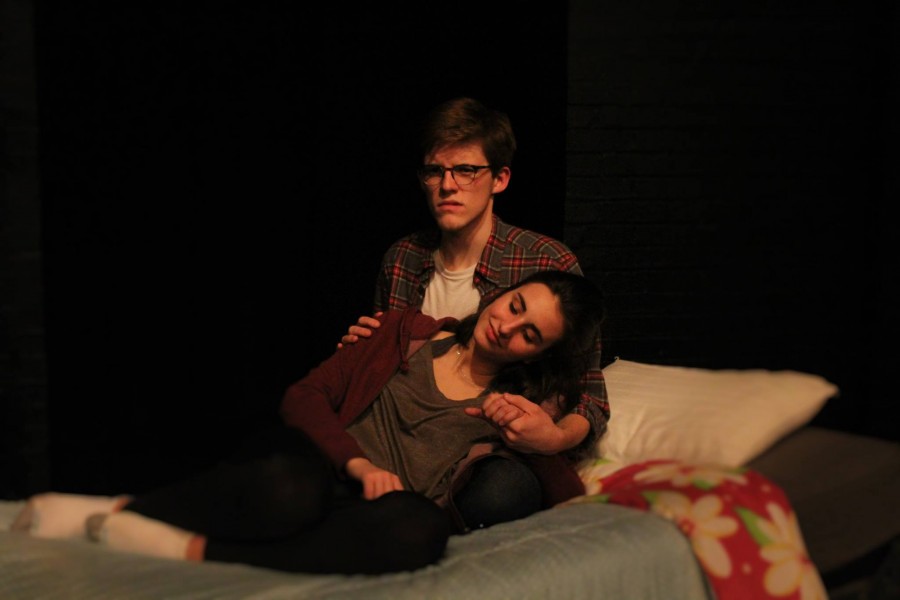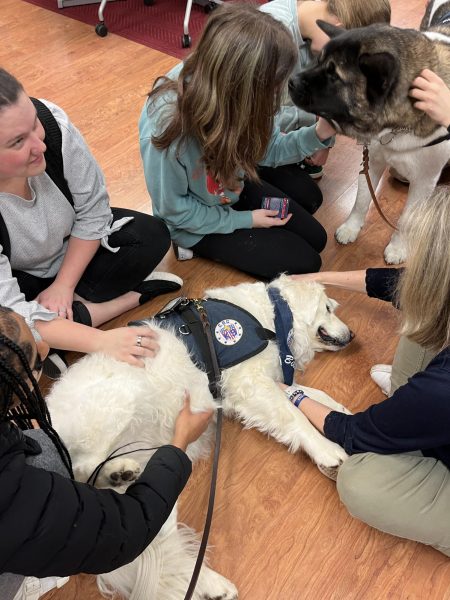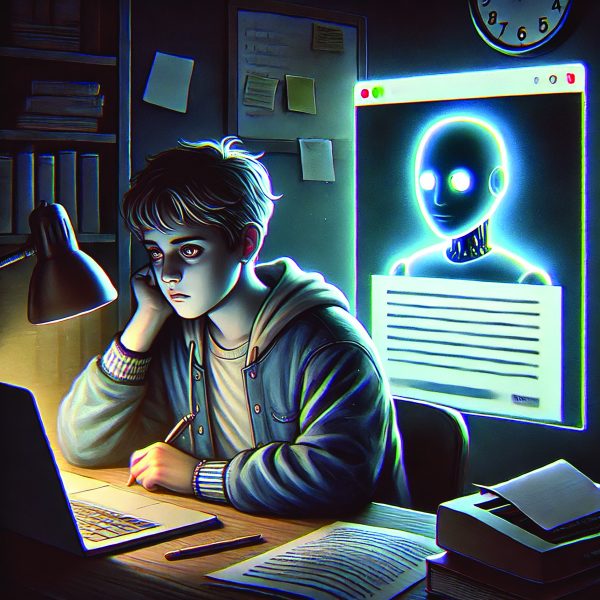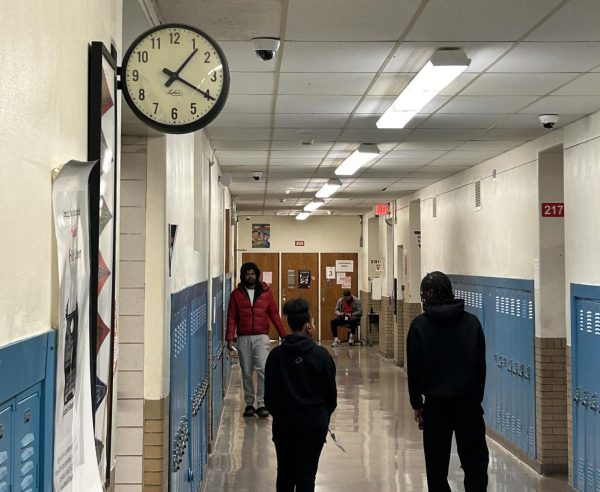New Stages 34 Explores Love, Loss and Laughter
With emotional ballads such as “The Lost Tapes” and “Lola” and hilarious comedies such as “3 AM,” New Stages impresses again
Cooper (Gus Mahoney) consoles Lola (Nora Spadoni) in the artful show “Lola” of this year’s New Stages performance.
This year’s New Stages impressed again, with more themes, surprises, twists and turns than ever before. It brought thoughts to my head and laughter from my mouth. After seeing it, there’s no question as to why it was sold out.
The first show, “Auntie Pearl,” written by Lori Goldberg and directed by Max Rotatori, was simple to start. It detailed Janet (Ruby Gibson), a high school student touring her dream college, near her Auntie Pearl’s (Shaye Robbie) home. Because Janet’s parents do not want to pay for the college’s room and board, she has to request to stay at Pearl’s home for her undergraduate years. Janet later reveals that Pearl has caused a scene at every family gathering, even Janet’s grandfather’s funeral.
Gibson and Robbie’s acting is well-done, and they elevate the simple writing of the script. The main problem with “Auntie Pearl” is that once it starts to confront challenging themes of love, it shies away. It ends with a “happy” ending, as Janet softens up to her aunt and decides to stay with her while she stays at the college.
Following such a lighthearted show, “Lola,” written by Elena Sola and directed by Davionne Gooden, illustrates major themes of life including depression, pain and boredom. Lola (Nora Spadoni) is found with a ticket to Las Vegas by her boyfriend Cooper (Gus Mahoney). Lola reveals to Cooper her boredom in their small hometown, and her frustration with Cooper’s obsession with her.
Throughout the show, Cooper reveals that Lola had been in a very bad marriage, and that Cooper finds her in a state of depression often. Spadoni plays Lola extremely eloquently, adding a serious and expressive personality to the character. Mahoney, an avid performer in past theatre performances, including a hilarious role of the “IB god” in the AP vs IB struggle from last year’s New Stages 33, creates a new personality for Cooper as well. He presents his character as controlling yet kind. “Lola” impressed me in ways that I didn’t think a show could, confronting themes that other new stages shows didn’t get close to.
After such an amazing show, “A Play on Words,” written by Max Laskey and directed by Ruth Geye, was somewhat of a disappointment. The play, which featured clever puns interspersed between rapid-fire dialogue, lacked any understandable plot.
The quirky show felt like a inside joke, that only some in the audience could get close to comprehending. It wasn’t extremely funny, or extremely powerful. It was a shame that this show was smushed into the middle of an amazing group of shows. Yet, actors Isaiah Steiner, Jason Ramsay and Elena Dumm all give enjoyable performances, and did what they could to lighten up the mood after such intense shows.
“The Lost Tapes,” written by Tommy Chesler and directed by Lauryn Hobbs, was an impressive look at the challenges of the rap music industry. Makaveli (Tavion Tate) and Ray (Miles McCallum) created ‘Strictly Dope,’ a rap music “company” to showcase their talent, operated out of Ray’s mother’s basement. As they rap, it is easy to see that both rappers have true talent. To change the plot though, as Ray fantasizes their career, Makaveli announces that he has been hired by a new and popular band.
Ray and Makaveli are both miserable and angry, yet also excited. Because Ray feels as if he has lost his place in the industry, he is infuriated, but also happy for Makaveli. McCallum (Ray) plays his character especially well, as does Tate (Makaveli). Their young talents will be appreciated in later productions, and they both played a part in the success of the show. Addressing tough themes of pain and joy, “The Lost Tapes” impressed me with the power of loss and love.
In contrast, “Expectations,” written by Hadas Marcus and directed by Kelsey Jones, is about the idea of love and success. When the show opens, Marigold (Isabel Wang) has just refused Fred’s (Jacek Staggs) wedding proposal, because they are only seniors in high school.
Although the theme of rejection became slightly repetitive between “Expectations” and “Lola,” Wang and Staggs’ acting is truly impressive. With their understanding of drama and the characters, they the show and its themes are a success. Unfortunately, “Expectations” was not nearly as exciting as “Lola,” and the repetitiveness of the theme between the two made the former difficult to appreciate.
As a bright and funny finishing point, “3 AM,” written by Isabela Carroll and directed by Jack Bistritz, was a definite highlight of all of New Stages. A student (Margi Weiss) is found about to go to sleep, when she finds out that a paper is due tomorrow. Her two sides, Brain (Hannah Modlin) and Heart (Josh Podl), try to help her, but the Heart tends to want her to slack off, enjoy life, and explore, while Brain wants absolute success.
Weiss, Modlin and Podl’s incredible acting secured the show’s triumph and brought it into hilarious conclusion, and their efforts were only aided by Carroll’s excellent writing. This show pulled off the incredible: addressing themes of love and success, while creating immense humor for the audience.
My favorite show would have to be “3 AM,” mainly because it was successful at never repeating itself and exciting the audience at every turn while remaining educational. “Lola” would follow closely behind, with beautiful acting and a great script. “The Lost Tapes,” “Expectations,” and “Auntie Pearl” would tie for third, all with amazing actors and directors. Somehow, though, “A Play on Words” never connected with me.
Yet each show brought a piece of the puzzle to the amazing New Stages 34, a true ballad of love and loss.






